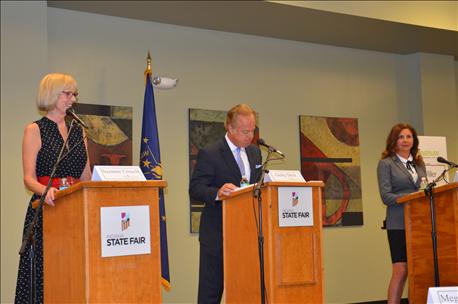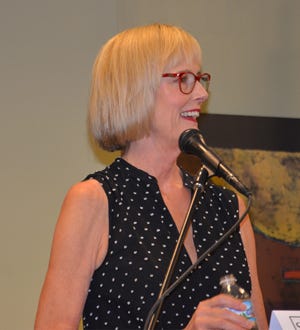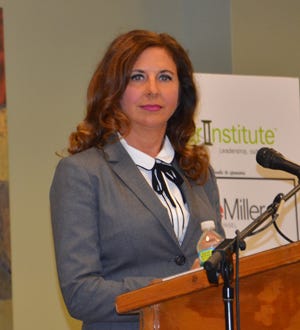
For the sixth time, the Indiana AgriInstitute sponsored a debate between the two lieutenant governor candidates. Held at the Indiana State Fairgrounds, this year’s debate featured Suzanne Crouch, the Republican nominee, and Christina Hale, nominated on the Democratic ticket. One of these two ladies will be Indiana’s next secretary of agriculture.
The debate was moderated by Gerry Dick, founder of Inside Indiana Business. The candidates made statements and responded to questions from a panel of journalists and policy experts.
Question: Indiana’s population is increasingly urban. Some believe rural Indiana is being left behind. How would you address that?

CANDIDATES SQUARE OFF: Gerry Dick moderated a debate between lieutenant governor candidates Suzanne Crouch (left), a Republican, and Democrat Christina Hale (right) recently.
Crouch: We have to have a balance. I will be seated at the table when the Indiana Economic Development Commission discusses economic growth. I will be able to promote opportunities for agriculture. We have to collaborate with the public and private sectors to grow the economy.
Hale: Each of Indiana’s 92 counties count. But in some rural counties, people aren’t feeling the economic recovery. Some rural counties are facing big problems with drug addiction. I saw signs in Union County that said "FARM." The acronym stood for "find and report meth labs." Many rural counties are struggling with these issues. We need a focused effort to support every county.
Question: The Legislature began addressing infrastructure issues in 2016. We’re particularly concerned about rural roads and bridges. What plans do you have for resolving this issue?

EAGER TO SERVE: Suzanne Crouch assured Hoosiers she is ready and willing to serve as the next secretary of the agriculture and rural development in Indiana.
Hale: There is ongoing discussion now. A Gregg-Hale administration would advocate setting up a $200 million limited fund that counties and communities could use for their most pressing needs of infrastructure. We need to be flexible, because not every county’s needs are the same.
Crouch: An interim study committee of the Legislature is looking at this now. The Indiana Corn Marketing Council funded a transportation study, too. The plan we come up with must be not just about the state level, but must benefit rural roads and bridges, as well. We will be strong advocates and work with local government and ag business to make sure we do it right.
Question: Broadband and internet connectivity in rural counties lags behind. How would you propose to move rural Indiana into the 21st century?
Crouch: We have "smart farms" today, and telecommunication is critical. It’s crucial for farms, businesses and schools. We need to shift the focus onto rural areas to see how we can best improve it. We also need to make sure we take steps necessary to connect farms, schools and businesses.

EXCITED FOR THE OPPORTUNITY: Christina Hale stated several times that she is pleased to be John Gregg’s running mate, and is ready to tackle challenges facing agriculture and rural Indiana.
Hale: Funding is difficult here. We’ve seen pushback from utilities because there are fewer people to support costs of infrastructure in rural areas. We must get creative about funding to get this done. We shouldn’t be afraid to take money from the federal government to build the infrastructure we need. It could be a way to bring local dollars back to rural areas, and leverage state funds at the same time.
About the Author(s)
You May Also Like




